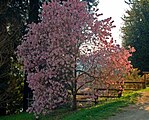Magnolia × loebneri
| Magnolia × loebneri | |
|---|---|

| |
| Flowers of Magnolia × loebneri 'Leonard Messel' at Burcina Park, Biella, Italy | |
| Scientific classification | |
| Kingdom: | |
| (unranked): | |
| (unranked): | |
| Order: | |
| Family: | |
| Genus: | |
| Subgenus: | |
| Section: | |
| Species: | Magnolia × loebneri
|
| Binomial name | |
| Magnolia × loebneri | |
Magnolia × loebneri Kache[1] is a hybrid of two Magnolia species, the Japanese Magnolia kobus and M. stellata.[2] crossed by Garteninspektor Max Löbner of Pillnitz, Germany, shortly before World War I;[3] it first flowered in 1917.[4] The deciduous, elegant[5] and compact multi-stemmed small flowering tree or large shrub, slowly attaining a height of 20 feet and somewhat wider at maturity, is hardy to USDA Zone 4.[6] Its fragrant late flowers, following its stellata parent by a couple of weeks, escape unexpected late spring frosts, but appear on the bare branches, to great effect. The deep pink buds open in informal strap-like tepals with pale shell pink upper surfaces and darker pink-purple lower ones. Like most magnolias, it thrives best on acid soils.
The selection, 'Leonard Messel' was a chance hybrid that was developed at Messel's garden in Sussex, Nymans. Also on the market are white 'Ballerina' and the late-flowering white 'Merrill' that extend the loebneri season.
-
Flower of Magnolia × loebneri
-
Pink-flowered plant of Magnolia × loebneri 'Leonard Messel' at Burcina Park, Biella, Italy
Notes
- ^ Kache designated the new hybrid in 1920, to honour Max Löbner.[citation needed]
- ^ "In every way similar to M. stellata": Ben Blackburn, "A promising hybrid magnolia", New York Botanical Garden Journal (1951:43ff).
- ^ Michael Dirr, Manual of Woody Landscape Plants (1983).
- ^ Oregon State University: Magnolia × loebneri.
- ^ "Elegant": Robin Lane Fox, Thoughtful Gardening (2010:92); "perhaps the finest of all the magnolias": Frances Tenenbaum, Taylor's 50 Best Trees(1999:65).
- ^ It "has performed well in the Minnesota Landscape Arboretum, according to Melinda Myers, Minnesota Gardener's Guide, (2005:213).


